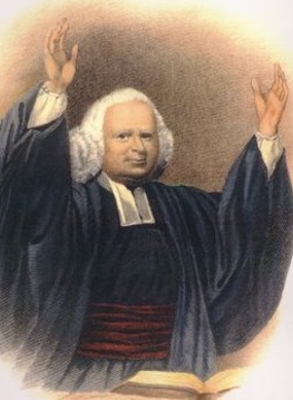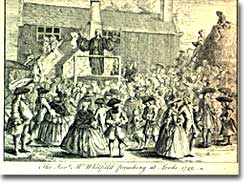There are four periods of time within the history of the United States Of America when the Holy Spirit Of God moved upon His people and turned their hearts to God. Some call this Revival. More recently the media named the last period The Jesus Movement. Call it what you will, it is God's Spirit Moving and filling us with a supernatural desire to seek Him. God is calling His People.
THE FIRST GREAT AWAKENING
| Jonathan Edwards |
The First Great Awakening was a religious movement among American colonial Protestants in the 1730s and 1740s. It began with Jonathan Edwards, a Massachusetts preacher who sought to return to the Puritans' strict Calvinist roots but recognized the importance and power of immediate, personal religious experience. "Sinners in the Hands of an Angry God" is perhaps his most famous sermon, but does not reflect the complexity of his thought as seen in his many sermons and essays. Edwards was a powerful speaker and attracted a large following.
 |
| George Whitefield |
The new style of sermons and the way people practiced their faith breathed new life into religion in America. People became passionately and emotionally involved in their religion, rather than passively listening to intellectual discourse in a detached manner. People began to study the Bible at home, which effectively decentralized the means of informing the public on religious manners and was akin to the individualistic trends present in Europe during the Protestant Reformation.
Those attracted to his message and that of the itinerant preachers who sprang up across the colonies called themselves the "New Lights," and those who were not were called the "Old Lights." The Great Awakening was perhaps the first true "American" event, and as such represented at least a small step towards the unification of the colonies. Thus, many historians point to the Great Awakening as one of a number of events which provided a basis for a true "American" society, and increased the independent, self-determined spirit of colonists.
Jonathan Edwards, a Massachusetts preacher, sought to return to the Puritans' strict Calvinist roots but recognized the importance and power of immediate, personal religious experience. "Sinners in the Hands of an Angry God" is perhaps his most famous sermon, but does not reflect the complexity of his thought as seen in his many sermons and essays. Edwards was a powerful speaker and attracted a large following. The English preacher George Whitefield continued the movement, traveling across the colonies and preaching in a dramatic and emotional style, accepting Christians as his audience.
The new style of sermons and the way people practiced their faith breathed new life into religion in America. People became passionately and emotionally involved in their religion, rather than passively listening to intellectual discourse in a detached manner. People began to study the Bible at home, which effectively decentralized the means of informing the public on religious manners and was akin to the individualistic trends present in Europe during the Protestant Reformation.
Those attracted to his message and that of the itinerant preachers who sprang up across the colonies called themselves the "New Lights," and those who were not were called the "Old Lights."
http://www.nhc.rtp.nc.us:8080/tserve/eighteen/ekeyinfo/grawaken.htm
The Great Awakening was perhaps the first true "American" event, and as such represented at least a small step towards the unification of the colonies. Thus, many historians point to the Great Awakening as one of a number of events which provided a basis for a true "American" society, and increased the independent, self-determined spirit of colonists.




No comments:
Post a Comment